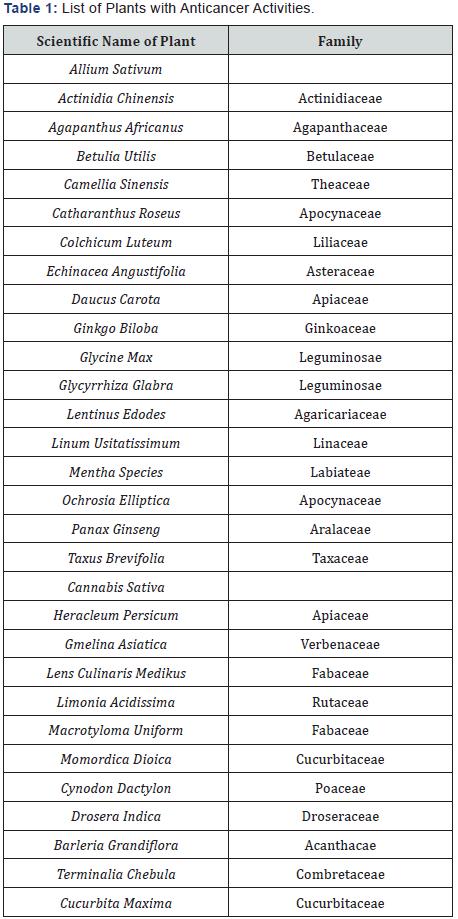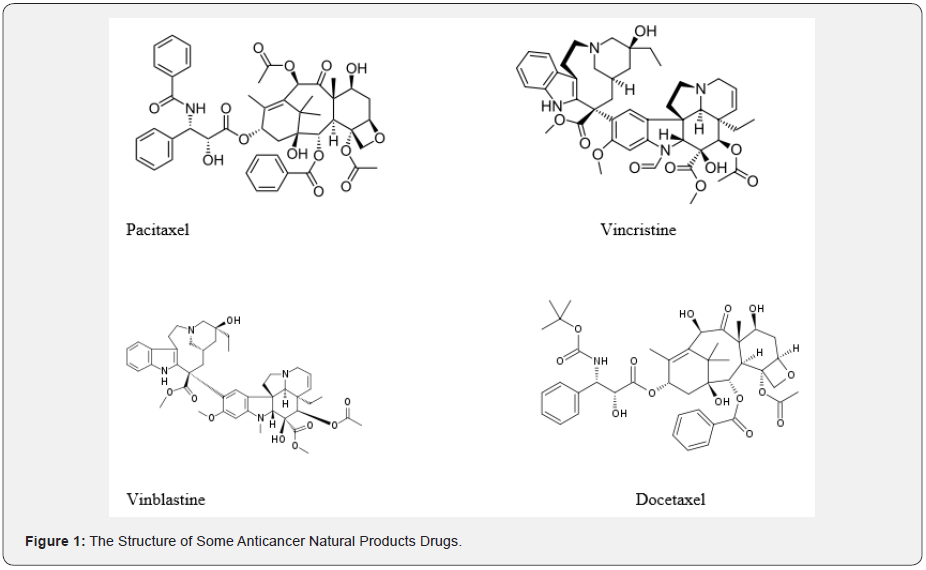Drug Designing & Development - Juniper Publishers
Abstract
Cancer is a global disease that will ultimately lead
to death. Though there are therapies, such as radiotherapy, chemotherapy
and chemically derived drugs to treat and prolong this life-threatening
disease, research have been progressing on the use of plant extracts as
anti-cancerous agents. Guyana has a highly rich bio diversified forest,
who’s aqueous and ethanolic crude extracts can be used to test for
their anti-cancerous effects. In addition, natural products, both novel
and non-novel can be isolated, and their anticancer activity
investigated. Once successful, isolated natural products can be
subjected to clinical trials and should add to the list of isolated
natural products used as anti-cancerous agents. The use of plant
extracts as anticancer drugs should be superior to that of current
treatments such as chemotherapy, because plant extracts have less side
effects and some are toxic to cancerous cells. Thus, there is a need to
screen the bio diversified flora of Guyana for its anticancer effect.
Keywords:
Cancer; Therapies; Bio diversified Flora; Plant extracts; Anti-cancer
agents; Crude drugs; Botanical; Derived Drugs; Isolated natural;
Anticancer effect; Chemically derived drugs; Herbal medicine;
Alternative treatment; Alkaloids; Antioxidant property; Secondary
metabolites
Abbreviations: BRs: Brassinosteroids; MLF: 4’-Methoxy Licoflavanone; ALF: Alpinumi Soflavone; DNA: Deoxyribonucleic Acid
Introduction
Globally, cancer is a disease that severely affects
the human population, ultimately resulting in death. The disease is
characterized by cells in the human body, undergoing uncontrollable
mitotic divisions, resulting in the formation of tumors s of malignant
cells which can lead to a metastatic state [1]. Tumors causes many of
the symptoms of cancer by pressuring, crushing and destroying
surrounding non-cancerous cells and tissues [2]. This abnormal growth is
caused by the damage of the cell DNA as a result of chemical and
environmental factors. Environmental factors include exposure to tobacco
smoke etc. According to the American Cancer Society, deaths arising
from cancer constitute, 2-3% of the annual worldwide deaths [3]. There
has been an increase in the mortality rate resulting from cancer over
the years. Cancer is the second leading cause of death in the USA.
The major causes of cancer are smoking, dietary
imbalances, hormones and chronic infections, resulting in chronic
inflammation [2-4]. Cancer treatment depends on the stage and type of
cancer. These include surgery, radiation therapy, chemotherapy,
biological therapy, hormone therapy etc. Despite the positive effects,
and its use to combat cancer, chemotherapy and radiation therapy can
cause traumatic side effects such as fatigue, sleep disturbance,
appetite loss, hair loss, sore mouth, changes in taste, fever and
infection, anxiety, depression, nausea and vomiting. These side effects
are often difficult to manage. Other harmful effects of these treatments
include hormonal and reproductive problems, effects on the immunologic
system, heart diseases, effects on kidney and urinary bladder, effects
on gastrointestinal organs, neurologic and psychological changes [4-5]
etc. Thus, there is an urgent need to find an alternative treatment for
cancer. This alternative complementary medicine comes from
herbs. An herb, also known as a botanical, is a plant or plant part used
for its scent, flavor and its therapeutic properties. The crude
ethanolic and aqueous extract of plants from the Guyanese flora have
been shown to possess antimicrobial [6-17] and antidiabetic activities
[18]. However, their anticancer research profile remains untouched. It
must be stressed that mankind first medicine were herbs and research
should continue in that direction to exploit herbal medicines.
Chemically derived drugs
Chemically derived drugs used in the treatment of
cancer includes 5-azacytidine (azacytidine; Vidaza) and
5-aza-2-deoxycytidine (decitabine; Dacogen) [19] etc. However, these
drugs have toxic side effects. Hence, the need for the use of plant
based complementary treatments.
Plants used in the treatment of cancer
Over the years, plant extracts have been studied for
their anticancer activities. The results have been promising. Table 1
shows a list of some plants used for their anticancer activities.
The list will continue to expand, as herbal cancer research
continues. In Guyana, the anticancer activity of plants has
received very little attention. However, its anticipated soon, this
will be addressed.

The anticancer activities of plants may be due to a single
compound or a combination of compounds. These compounds
include polyphenols, brassinosteroids and taxols. Polyphenolic
compounds include flavonoids, tannins, curcumin, resveratrol
and gallacatechins [20]. Resveratol are found in foods including
peanuts, grapes and red wine. Gallacatechins are present in green
tea. Polyphenols reduce the risk of cancers and improve a person
health by virtue of their natural antioxidant properties [20-22].
Polyphenols are thought to kill cancer cells via apoptosis. They
can achieve apoptosis via the mobilization of copper ions which
are bound to chromatin inducing DNA fragmentation. In the
presence of Cu (II) ions, resveratrol was seen to be capable of
DNA degradation. In addition, polyphenols can interfere with
proteins which are present in cancer cells, thus destroying
cancer cells [23].
Flavonoids are another class of compounds with anticancer
activities. They are from the polyphenolic compounds and
constitute a large family of plant secondary metabolites with
over 10,000 known structures [24]. Several plants have been
investigated for their high flavonoid content and anti-cancer
activity [24-28]. There is a high content of flavonoid compounds
in anthocyanins, flavones, flavonols, chalcones in seed of certain
plants [27]. Plant extracts have also shown anticancer effects.
For example, flavonoids extracted from Erythrina suberosa
stem bark (4’-Methoxy licoflavanone (MLF) and Alpinumi
soflavone (ALF) were shown to have cytotoxic effects in HL-60
human leukaemia cells [27]. Fern leaf extracts, which are rich
in flavonoids, have demonstrated high percentage of anticancer
activity [28]. Purified flavonoids from plant extracts have also
shown anti-cancer activities against other human cancers
including hepatoma (Hep-G2), cervical carcinoma (Hela) and
breast cancer (MCF-7) [27]. Brassinosteroids (BRs) are naturally occurring compounds
found in plants which have hormones regulation process
that controls growth, differentiation of cells, elongation of
stem and root cells, resistance and tolerance against disease
and stress. Some Naturally BRs have shown anti-cancerous
effects. For example, 28-homocastasterone (28-homoCS) and
24-epibrassinolide (24 epiBL) [28-30].
Anticancer natural products
Anticancer Natural Products derived from plants, which
have been proven successful at clinical trials have been reported.
These drugs are administered as part of a patient’s dietary
intake [31], Examples of natural products isolated from plants
that have been used as anticancer drugs are vinca alkaloids such
as vincristine, vinblastine, vinorelbine, vindesine and vinflunine.
These drugs inhibit microtubules formation of cancerous cells
by binding to β-tubulin. Another class includes the Taxanes such
as paclitaxel and its analogue docetaxel. These drugs function
as microtubule inhibitor of cancerous cells. Paclitaxel prevents
replication of cancer cells as it stabilizes or polymerises
microtubules in the cells [32,33]. Drugs combination may have
a synergistic effect that augment their anticancer activity and
improve their efficacy as therapeutic agents. This is noticeable
with vinca alkaloids, Taxus diterpenes, Podophyllum lignans and
Camptotheca alkaloids in plant extracts [34]. Figure 1 shows
some isolated natural products with anticancer activity.

Conclusion
Thus, there is an urgent need to continue the use of herbal
medicines to combat cancer. Plant extracts are advantageous in
that they are selective i.e. non-toxic to normal cells, but cytotoxic
to cancer cells. Guyana’s flora needs urgent screening to add
to the list of plants that can combat against cancerous cells. In
addition, isolation of natural products may lead to new anticancerous
agents.
To Know more about Drug Designing & Development
Click here: https://juniperpublishers.com/napdd/index.php
Click here: https://juniperpublishers.com/napdd/index.php
To Know more about our Juniper Publishers
Click here: https://juniperpublishers.com/index.php





I wasted a lot of money trying to find the right medication for my moms dementia all to no avail until Dr Erayo showed up and eradicated the stigma with the natural roots and herbs i ordered from him , my mom took it for 21days and she was cured from her dementia.
ReplyDeleteGod have use Dr Erayo herbal home to cure my mom, thank you so much Dr Erayo I am so happy. You can email Dr Erayo for help drerayoherbalhome@gmail.com
or whatsapp him on +2348151937428
website---- https://alternativeherbs.weebly.com
Youtube link---- https://www.youtube.com/channel/UCSp2m-_EHnCRQT4gYYTQWtg
FB page---- https://rb.gy/yuofn6